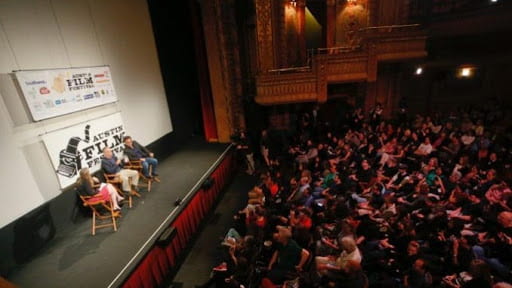Developing characters at the Austin Film Festival
Editor’s Note:
For the past several years, the Austin Film Festival has been busy digitizing their recordings of the festival panels, which they’ve maintained since the first year in 1994. That’s over 25 years’ worth of conversations from the best in the business, including Shane Black, writer for Lethal Weapon and writer-director for the Predator movies; Jim Dauterive and Mike Judge, who worked on the television series King of the Hill together; and Poly Platt, producer for Broadcast News and Say Anything. The Wittliff hosts select recordings online, and you are welcome to peruse them at your leisure here: https://digital.library.txstate.edu/handle/10877/6478. Wittliff staff relies heavily on student workers to get these materials online and create closed-captions for each recording. Today we hear from Jessica Henriquez, a senior English major, who worked with Archivist Lauren Goodley on the project this past summer.
As an intern for the Austin Film Festival OnStory Archives at The Wittliff Collections this summer, I was able to listen to many different festival panel recordings which included a variety of conversations, from how a screen writer comes up with a story, to how different genres of movies can make a great film. I heard writers talk about finding inspiration from other films, or from just sitting in an empty room. As an English major, my classes require me to think and write about books and character development. Listening to film-makers discuss their craft helped me understand how a film and a book are similar. You must come up with a story that captivates the audience.
One conversation that stood out to me was, “Car Chases, Explosions, and Fist Fights, a.k.a “The Fun Stuff” Part 1, with the screen writers Scott Rosenburg and Shane Black. The panel interview is about action films and how they can be good or bad films. Shane Black does not like the moniker “action films” because he believes the films are more than that. Action films are just explosions and fights—you do not get to really put in any plot twist or character development. Sometimes the stories do not make any sense, or are not related to any of the action.
“I think it’s a bit of a misnomer to call things ‘action films,’ because, especially now, when it’s more important than ever to distinguish the content of one of these films from another. You know, we’ve reached–to my thinking, it represents a real dead spot in action where more is more and it’s one continuous shout from start to finish, without any sort of toning, or ups and downs, or variations in pitch.
So, I think the trick is to do thrillers, you know, that have action in them. If you saw North by Northwest, there’s a plane crash, there’s a downhill car out of control, there’s people falling off Mount Rushmore. And if you saw it today, you’d probably call it an action film, but that wouldn’t be correct. I think it’s more appropriately a thriller or an adventure film, and I think it’s that that’s what the mark is to shoot for, so why not call it what you want it to be? Rather than sort of cynically represent it as something that becomes a self-fulfilling prophesy, and soon all these movies are just about motion. Things flying through the air, and bouncing, and exploding and what-not. I think it’s a real mistake.”Audio: https://mediaflo.txstate.edu/Watch/q3CEe8b4
Throughout the interview, there is a lot of humor being thrown around, and it’s refreshing to hear the filmmakers at times diss their own films. In this clip, Shane Black describes how it is a bad idea to remake classic films, especially the good ones. However, he had found a reason to remake the 1974 film Gone in 60 Seconds.
“Perfect example: I had no problem remaking Gone in 60 Seconds. Because the original movie, while it worked for what it was, wasn’t that great. We wound up making a version that was worse.” Audio: https://mediaflo.txstate.edu/Watch/b8X9Dke5
I found interesting how they were talking about certain actors who always play the good guys, can also possibly play a bad guy in film. It would be refreshing to see on screen. They also mention how it is hard to kill heroes in film because you can never get those characters back and how a film can work with the hero having no flaws. Apparently, action films are not just “car chases and explosions.” I learned about the importance of character in action films.
